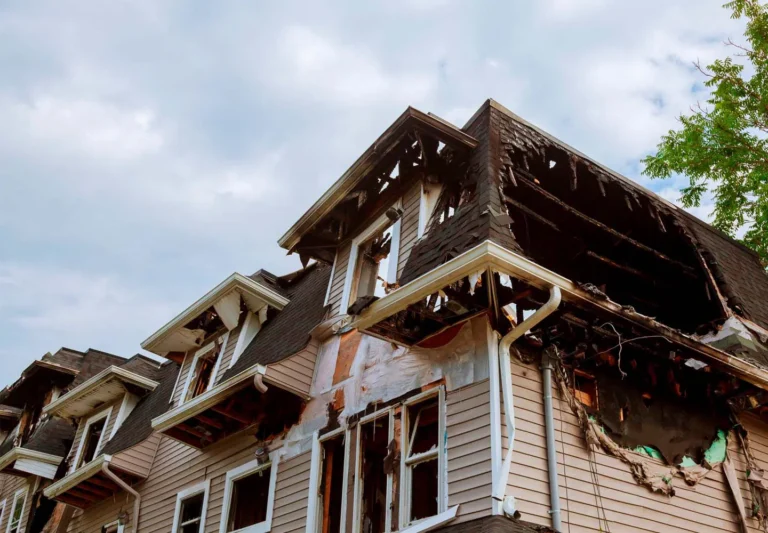Before taking any action, assessing the extent of the damage is essential. This process helps determine the cost of repairs and whether the property is safe to remain in or requires evacuation.
1. Conduct a Thorough Inspection
- Check for structural damage, such as cracks in walls, weakened foundations, or collapsed roofs.
- Look for water damage if there has been flooding or leaks.
- Assess electrical and plumbing systems for any hazards.
- Take note of personal belongings that have been affected.
2. Ensure Safety for Occupants
- If the damage compromises the safety of residents, evacuate the property immediately.
- Disconnect electricity and gas to prevent fire hazards.
- Secure valuable belongings that are still intact.
3. Document the Damage
- Take clear photographs and videos of the affected areas.
- Write a detailed report describing the extent of the damage, including estimated costs for repairs.
- Collect any receipts or records related to previous maintenance or repairs.
Exploring Financial Assistance and Relief Options
Without insurance, property owners must look for alternative ways to finance repairs and replacements. Several government agencies, financial institutions, and community organizations in Egypt offer support.
1. Government Assistance Programs
The Egyptian government occasionally provides relief funds or compensation for disaster-related damages. Some agencies to contact include:
- The Ministry of Social Solidarity – Offers emergency financial aid for affected families.
- The Ministry of Housing, Utilities, and Urban Communities – May provide reconstruction support for low-income individuals.
- Local Municipalities – Some governorates offer special relief funds for citizens facing property damage due to natural disasters or accidents.
2. Seeking Help from NGOs and Charitable Organizations
Several non-governmental organizations (NGOs) and charities in Egypt provide financial aid and reconstruction support for individuals affected by disasters:
- Egyptian Red Crescent – Assists with emergency relief efforts.
- Resala Charity Organization – Offers community-based financial and housing support.
- Misr El-Kheir Foundation – Supports families in financial distress.
3. Exploring Loan and Financing Options
For property owners who do not qualify for government or NGO assistance, banks and microfinance institutions offer loans to help cover repair costs. Some available options include:
- Personal Loans from Egyptian Banks – Most banks, including Banque Misr and National Bank of Egypt, provide personal loans for home improvement.
- Microfinance Loans – Organizations like Tamweely and Tasaheel offer small loans for home repairs.
- Crowdfunding and Community Fundraising – Digital platforms like GoFundMe or local social media groups can be used to raise funds.
Legal Recourse for Compensation
Depending on the cause of the damage, legal action may be an option for recovering financial losses.
1. Holding Responsible Parties Accountable
If the damage resulted from another party’s negligence, legal claims could be filed. Common cases include:
- Construction Defects – Property owners can sue contractors or developers for structural faults.
- Landlord-Tenant Disputes – Renters may claim compensation if landlords fail to maintain the property.
- Utility Failures – Damage due to poor municipal services, such as water main bursts or electrical surges, may qualify for legal claims against service providers.
2. Filing a Lawsuit for Compensation
Property owners can seek compensation by:
- Consulting a real estate lawyer for advice.
- Filing a complaint with the Egyptian Consumer Protection Agency.
- Taking legal action through local civil courts.
Emergency Repairs and Damage Control
While securing financial assistance, temporary solutions can prevent further property damage.
1. Temporary Fixes
- Cover exposed areas with plastic sheets or tarps to prevent weather-related damage.
- Reinforce weak structures with support beams.
- Use sealants for minor leaks and water damage.
2. Negotiating with Contractors
- Request multiple repair estimates to find the most affordable service.
- Seek community-recommended laborers for cost-effective repairs.
- Consider installment-based payment plans with contractors.
3. Salvaging Usable Materials
- Repurpose materials from damaged areas for reconstruction.
- Use second-hand furniture or recycled materials to lower costs.
Preventative Measures for Future Protection
After managing the immediate crisis, property owners should take steps to safeguard against future damage and financial strain.
1. Investing in Affordable Property Insurance
Although full coverage policies may be expensive, low-cost alternatives can offer partial protection:
- Basic Fire and Theft Insurance – Covers essential risks at a lower premium.
- Community-Based Insurance Plans – Some neighborhood associations provide pooled insurance coverage.
- Government-Subsidized Insurance Programs – The Egyptian government occasionally offers affordable insurance schemes for low-income households.
2. Strengthening Property Security
- Install burglar-proof doors and windows to prevent theft-related damages.
- Reinforce walls and roofs to withstand extreme weather.
- Regularly inspect and maintain electrical and plumbing systems.
3. Building an Emergency Fund
- Setting aside a small amount of savings each month can help cover unexpected repairs.
- Community-based savings groups (e.g., El Gamiya) provide pooled funds for emergencies.
Conclusion
Property damage without insurance can create significant financial strain, but there are ways to navigate the situation. By assessing the damage, seeking financial aid, exploring legal recourse, and implementing emergency repairs, property owners in Egypt can effectively manage the crisis and reduce long-term losses. Additionally, leveraging community support, negotiating with creditors, and seeking assistance from government relief programs can help ease financial burdens during recovery.
Looking forward, investing in affordable insurance, reinforcing property security, and setting up emergency savings can provide long-term protection against future risks. Exploring flexible insurance options, understanding coverage terms, and working with financial advisors can also help property owners make informed decisions. While unforeseen damage cannot always be avoided, being proactive can ensure financial stability, faster recovery, and peace of mind for property owners across Egypt.
